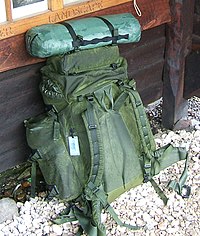
Flashpacking
Flashpacking is a neologism used to refer to affluent backpacker. Whereas backpacking is traditionally associated with budget travel and destinations that are relatively cheap, flashpacking has an association of more disposable income while traveling and has been defined simply as backpacking with a bigger budget.
A simple definition of the term Flashpacker can be thought of as backpacking with flash, or style. One school of thought defines the flashpacker as a rapidly growing segment of travelers who adhere to a modest accommodation and meal budget, while spending freely, even excessively, for activities at their chosen destination. Another school of thought defines flashpacking as an incongruous mix of 'slumming it' and luxury; of adventurous travel with those on a budget by day and sedate dining and comfortable accommodation by night. Flashpackers have been further defined as tech-savvy adventurers who often prefer to travel with a cell phone, digital camera, iPod and a laptop, although none of these is required in order to be a flashpacker. As with other forms of travel, the term flashpacker is mainly one of self-identification. The origin of the term itself is obscure.
The term also reflects a growing demographic of travelers who are forsaking traditional organized travel, venturing to destinations once the reserve of more adventurous backpackers, and the increasing number of individuals who leave well paid jobs or take 'career breaks', using the time to travel independently, but with greater comfort and many of the gadgets they are accustomed to at home. As a result, hostels are evolving and offering more up-market accommodation to those still traveling on a budget in order to obtain their business. The hostels have realized a need to evolve in order to meet the changing demands of travelers.
Gap-packing
"Gap-packing" is a neologism used typically to refer to younger people, usually of European descent, who backpack to several countries in a short period of time whilst on their gap year between school and university, or between university and their first job.
Culture
Of importance in backpacking is a sense of authenticity. Backpacking is perceived as being more than a vacation, but a means of education. Backpackers want to experience the "real" destination rather than the packaged version often associated with mass tourism, which has led to the assertion that backpackers are anti-tourist. There is also the feeling of "sneaking backstage" and witnessing real life with more involvement with local people
Criticism
Backpacking, like other forms of travel, remains controversial. Some of these criticisms date back to travelers' actions along the Hippie Trail. Criticism comes from many sides, including the host countries and other travelers who disagree with the actions of backpackers although the perception of backpackers seems to have improved as backpacking has become more mainstream. Erik Cohen notes that even though one of the primary aims of backpacking is to seek the authentic, the majority of backpackers spend most of their time interacting with other backpackers and interactions with locals are of "secondary importance"
From http://en.wikipedia.org/
BCBGMAXAZRIA Women's Lou V-Neck Short Cocktail Dress
-
by BCBGMAXAZRIA
BCBGMAXAZRIA Women's Lou V-Neck Short Cocktail Dress
[image: BCBGMAXAZRIA Women's Lou V-Neck Short Cocktail Dress]
This sleeveless dress fe...







0 comments:
Post a Comment